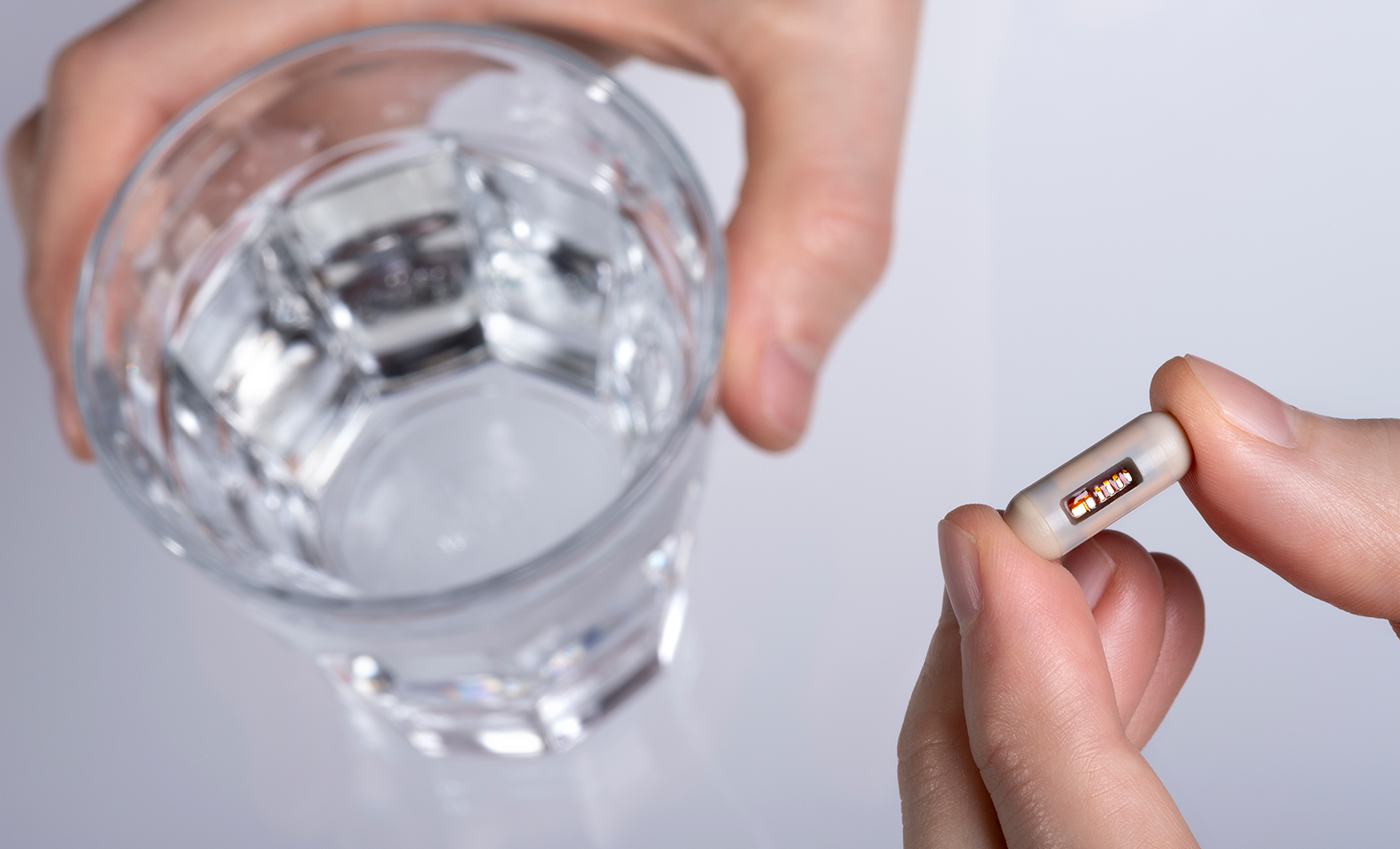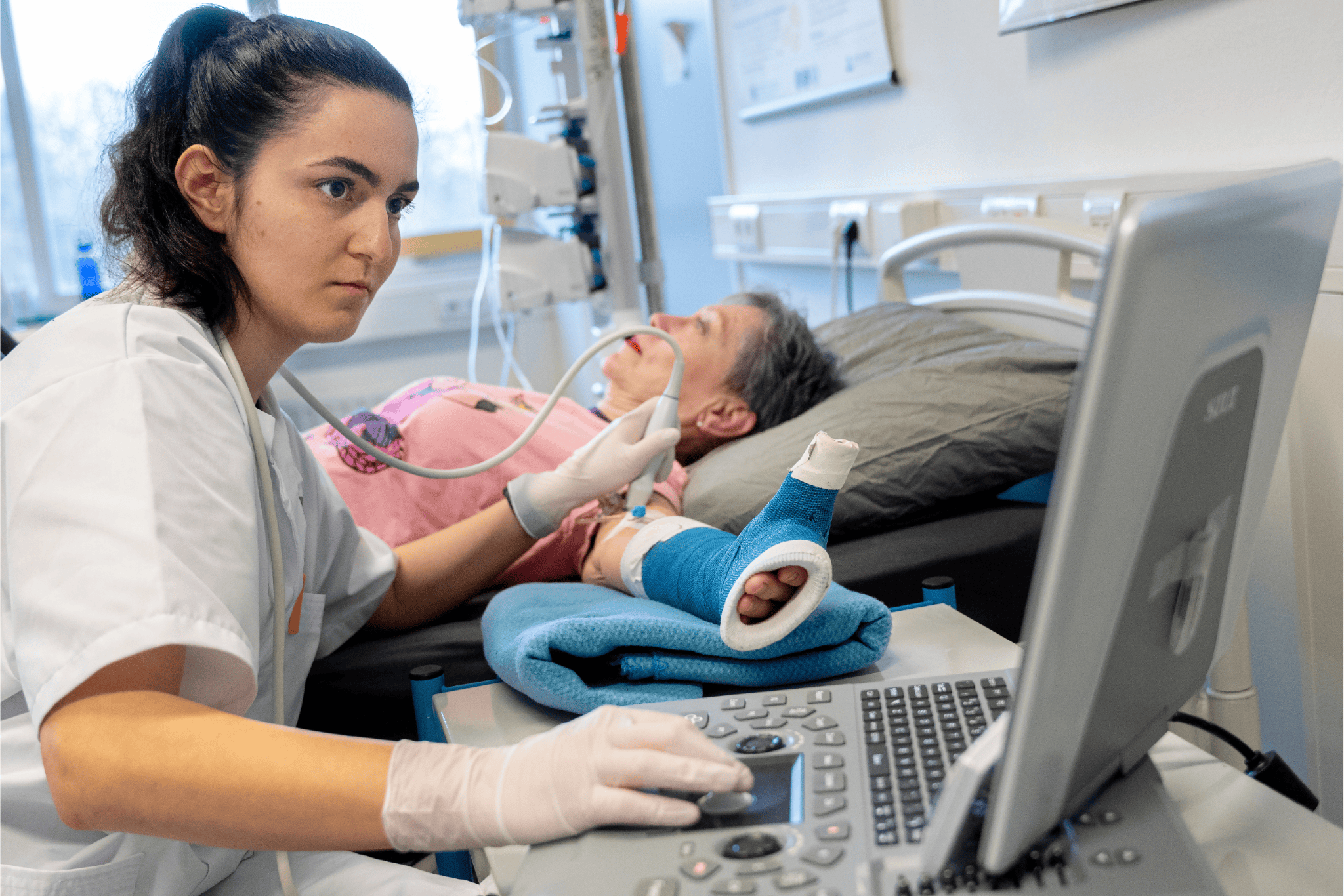OnePlanet Research Center has just won the Klokhuis Science Prize for its smart toilet seat. The centre, a collaborative venture that includes WUR, develops smart technology for healthcare — including sensor pills you can swallow that take measurements inside your gastro-intestinal system
The pill, which is the size of a vitamin supplement, has a mini-window containing five sensors. This lets the smart device measure temperature and acidity, for example, as it travels through the gullet, stomach and intestines. The pill performs a measurement every 20 seconds during the whole journey from mouth to bum. The little pill has three tiny printed circuit boards that control the pill and process the data. The pill uses a built-in antenna to communicate with an external device — the size of a pack of cards — that the subject wears and that provides additional storage. A further connection between that device and a central computer lets the researchers watch what is happening in the body in real time.
PhD candidate Roseanne Minderhoud (Human Nutrition and Health) is using these sensor pills to study protein fermentation in the large intestines of humans. ‘We are the first to use these sensor pills for research,’ she explains, ‘so we have to figure out what works and how we can make best use of the pill with all its data in our studies.’
Lots of data
In her first study — the results of which she will soon be publishing — all the test subjects were given a controlled diet. They had to take the sensor pill at five specific moments — including at the start of the study, after a night without food and after a day of eating. ‘The pill progresses at the same speed as the food through your digestive system.
The pill performs a measurement every 20 seconds throughout the journey from mouth to bum
If you haven’t eaten that night, it will travel through your body much faster because your stomach is empty. If you eat three big meals in a day, your stomach will be full and so the pill will spend longer in the stomach.’
In addition to the sensors, all the pills contain an accelerometer and a magnetometer. ‘The accelerometer records acceleration. That lets us measure how fast the pill travels through the body, but it also picks up if someone plays sport or exercises,’ says Minderhoud. ‘At the moment, we can’t tell those two types of movement apart. In future, we could use smartwatches to collect data about movement to distinguish between physical exercise and the pill moving through the body.’
Collecting poo
‘We are working on ways to predict when the pill will exit the body,’ explains Minderhoud. At present, the test subjects have to collect their faeces and hand the poo in to the researchers so they can fish out the pills. ‘But in future, perhaps the people will get a message from the external device they wear when the pill is about to exit their body.’
All the participants in the pilot study had to collect their poo at any rate. ‘That was partly for safety reasons: it let us confirm that all the pills had been excreted. But we also wanted to recalibrate the pills and see whether the sensors could still perform measurements as well as before. That turned out to be the case: all the sensors’ responses were exactly the same after travelling through the body.’
Biologically relevant
Now that the initial glitches have been dealt with, the researchers can look at the biological relevance of the sensor pill, for example by measuring what happens in the gut for a range of diets. ‘We gave the test subjects two different standard diets. We were curious to see whether a difference in the source of protein led to a different acidity due to fermentation. There were almost no other differences between the diets.’
The pills can also provide information about other health parameters such as the redox potential. That is the balance between oxidants, aggressive substances that can cause harm to cells and tissues, and the antioxidants that combat such harm, explains Minderhoud. ‘It is very difficult to measure in the lab because the potential is highly sensitive to oxygen. This sensor lets us measure exactly what happens in the body without external disruptive factors. An imbalance in the redox potential will tell us more about the resulting oxidative stress — a lot of stress damages the cells from the inside.’
Healthy and sick
In addition to fundamental scientific knowledge about what happens in the intestines, Minderhoud thinks the pills could help the medical world too. ‘We now have data on a small cohort of healthy people with a range of ages. In future, we could compare them with patients with intestinal conditions such as Crohn’s disease or colitis, for example. The pills let us find out what is happening in the intestines using a non-invasive technique, without having to insert tubes.’
OnePlanet is also working on pills that can collect samples, for example of intestinal juices. ‘The sensor data lets us work out where the pill is in the gastrointestinal tract. You press a button and the sampling pill opens up a tiny bit to collect the fluid in an internal cavity, then it closes again. We still need to check whether the pill does indeed open up when we press that button, and make sure it closes again sufficiently so that the sample doesn’t get contaminated with fluids further along in the gastrointestinal tract. The technique is promising though, especially for samples in the small intestine and the start of the large intestine, because it would avoid the need for an endoscopy, which causes so much distress.’

 Smart capsule, developed by OnePlanet
Smart capsule, developed by OnePlanet 

